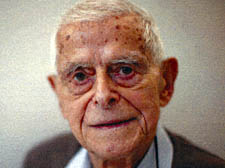|
|
 |
| |

Jerry Morris |
Doctor Jerry’s ground-breaking health research
WHY do bus conductors live longer than bus drivers? Such questions were the stock in trade throughout Jerry Morris’s long life. The doctor, epidemiologist and polymath, who has died aged 99, used this simple fact to become a worldwide authority on the relationship between exercise, class and life expectancy.
From looking at their working habits – conductors were constantly going up and down stairs, while drivers were sitting still – he help formulate scientific research into a fact that is a given today. Namely, that exercise is good for your heart. But when Jerry, who lived in Highgate, did his research in the 1940s and 1950s, this link was not as obvious as it seems to day.
He was born in Liverpool in 1910 and went on to study medicine in Glasgow and London. Jerry’s own brilliance stood out even as a student. The celebrated doctor Sir Thomas Lewis, who had refused to take medical students on, was so impressed by Jerry he took him under his wing and taught him.
Jerry’s wartime service saw him posted to India and then on to Burma, where he ran the largest hospital in the country dealing with recently liberated prisoners of war. He was the first doctor to administer penicillin in India to wounded soldiers.
In the 1930s, he struck up a friendship with social scientist Richard Titmuss and their work helped influence government health policy.
His brothers were also successful: Max became the president of the National Union of Teachers, while his younger brother, Isiah, a doctor, won the Military Cross during the Second World War.
But tragedy befell the family in 1948. Isiah had travelled to Israel to work as a doctor, treating those injured during the Israel-Palestine war. He was killed whilst tending to the wounded.
After the war Jerry was funded by the Medical Research Council to look into the relationship between poverty and poor health. A lifelong socialist, he was a key figure on many health committees in the early days of the NHS that helped define the aims of improving the nation’s health for everybody.
Jerry sat on the Royal College of Physicians committee studying smoking and air pollution in the 1950s, through to the Black committee in the 1970s that studied inequalities in health. His work was groundbreaking and has been used by generations of leading social scientists.
His work on heart disease was recognised by the International Olympic Committee and at the centennial Olympics he was given a special medal for his work on exercise and the heart. He was also awarded a CBE.
Retirement meant nothing to Jerry. He was receiving research grants well into his 90s. He joked that the people handing out the money probably were not aware from his précis that he was an older man. Even as he fell ill, he was asking friends – through an oxygen mask – for the latest news, from the postal dispute to how BNP leader Nick Griffin had fared on Question Time.
To think of Jerry’s life in terms of his immense contribution to public health overlooks his fanatical interest in culture. He read widely, a subscriber to the London Review of Books, the New York Book Review, the New Yorker, Prospect and the British Medical Journal. He was also an insomniac, and would read two to three thrillers every week.
His friends will recall how he simply could not sit still: in the two months before his death, Jerry had been to 14 plays, four operas and two concerts.
At his funeral last week, his son David told the story of how he was adopted by Jerry.
He said: “My dad joked: I’ll adopt you because you have big ears, and therefore no one else will take you.”
DAN CARRIER |
 |
|
|
 |
| |
| |
|
 |
|

